Why Deep Living Is The Magic Key To Unlock Your Authentic Life Purpose

Have you been searching for your life purpose? Or yearn to connect more deeply with what matters?

What is a good life?
Want to know what it takes to live a good life? Then you’re in the right place.
In this post we’ll be uncovering exactly what Deep Living is.
And why it’s the magic key to greater purpose, meaning and fulfilment in your life.
You’ll discover:
- what Deep Living is (and isn’t) and why it matters;
- the four stages of Deep Living and how you can move through them;
- plus, a range of tools and strategies to support your growth
You may want to bookmark this post so you can return to it again and again.
Let’s dive in.
What is Deep Living?
Rather than define Deep Living, it’s easier to define the opposite.
Shallow Living.
It’s easy to intuit what a shallow life is.
Shallow Living is the weight of other people’s expectations. Being inauthentic. The distractions and performative nature of social media. Hustle. Flex culture. Superficial relationships. The blight of consumerism, environmental destruction and waste. A lack of self-reflection.
Ultimately? Shallow Living is doing things that don’t matter.
It’s anything that prevents you from living an authentic, deep and meaningful life for yourself.
By contrast, Deep Living is a life of purpose, meaning and fulfilment.

What is the point of Deep Living?
Deep Living is powered by:
- balancing action with rest
- practising presence and gratitude
- crafting a kit of supportive tools and habits
- spending time in nature and connecting with loved ones
- calming your nervous system and building resilience
- becoming your most authentic, altruistic, integrated self
Essentially? The goal of Deep Living is to become more and more you. It’s about thriving in your own purpose. No matter what others think.
It’s about tuning in to the values, desires and callings that you crave, need and love.
It’s about defining what matters to you. And then having the courage and resilience to live that life.
Why does Deep Living matter?
Society is full of shallow distractions that are hurting the planet, ourselves and each other.
In order to evolve beyond trauma, hostility and consumerism? We need to embrace a deeper life.
Deep Living is about embracing sustainable values, inner wisdom, healing and calm.
A deep life is about more joy, justice and belonging. For all.
Is Deep Living Selfish?
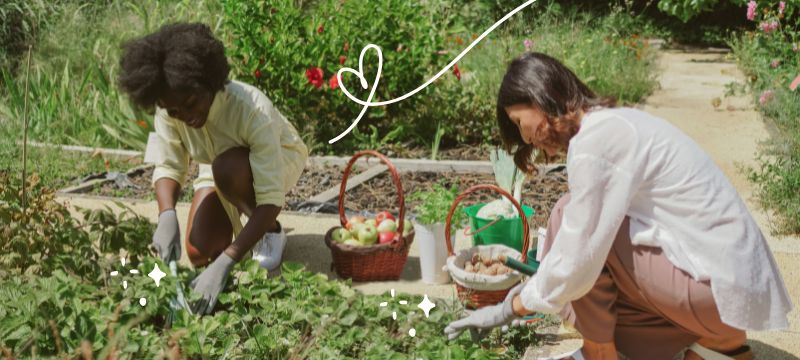
Have you ever met someone that was living a life that mattered?
Did they seem selfish? Or did they seem kind, generous and empathic?
Many people who live a meaningful life are also altruistic.
Because the more connected to your values you are, the more authentic you are.
The more authentic you are? The less self-conscious you are.
And the less self-conscious you are? The more you can serve others from a place of genuine love.
Which means that Deep Living isn’t selfish at all.
What does a deep life feel like?
Deep Living is a crucial factor in achieving transcendence: the awe-inspiring experiences where you feel connected to something larger than yourself.
You could feel it when you become involved in a local neighbourhood project - like building a community garden.
Or when you work towards your vision of a better world - like curing the world of infectious diseases.
You might feel transcendent when you share your hard-earned wisdom with others. Or it could be while communing with the majesty of nature.
You may feel elevated emotions such as belonging, awe, joy and fulfilment. But ultimately transcendence is a shift in focus from the self to others.
What Deep Living Is Not
- Deep Living Is Not All About You
Social justice is at the heart of Deep Living. Healing cannot happen in a vacuum. And healing is for everyone.
Which means we cannot ignore the systems of oppression that make life harder for marginalised people.
- Deep Living Is Not About Perfection
Living deeply requires challenging the status quo. And that often means things get messy.
Deep Living requires vulnerability, authenticity, and self compassion. It’s about learning to embrace the ordinary, imperfect moments in life. It’s about savouring your journey.
There are no guidelines or rules. Your deep life isn’t better or worse than anyone else. It’s a quiet beckoning towards what matters to you.
- Deep Living Is Not About A Grand Life Potential
Maybe what matters to you is healing from trauma. Volunteering at your local charity. Or raising your children with presence and love.
Perhaps it’s about embracing the ordinary. Or creating art that is meaningful to you.
As writer Ephrat Livni says,
“For a life to be valuable, or meaningful, it needn’t be unique.”
The 4 stages of Deep Living

There are four general stages to Deep Living.
Each stage calls for different tools and supportive strategies. So you can grow into your life’s purpose. And start feeling more fulfilled.
Of course, life is rarely as linear as we would prefer. What works in one stage of Deep Living could easily work in any other. There is often overlap.
But laying out these stages may help you recognise where you’re at. And this could give you insight on how to move forward.
Stage 1: Lost and Lonely
The Shallow Life weighs you down. Because you’re wearing the weight of other people’s expectations. It can be isolating, miserable and soul-destroying.
If you feel trapped, lonely, anxious or disconnected - chances are you’re stuck in the shallows.
The good news? There is more to life than this. And the best way forward is to reach out for help.
Supportive practices for growth include:
- Finding a trauma informed therapist
- Beginning a yoga or breathwork practice
- Journaling to connect with your inner self
- Soothing the nervous system with meditones®
- Watching comedy or belly laughing with friends
- Writing down 3 things you’re grateful for each day
- Spending time in nature
These things will help you find the courage to live as your true self.
Instead of hiding who you are or living for other people? You’ll start to feel more calm and free.
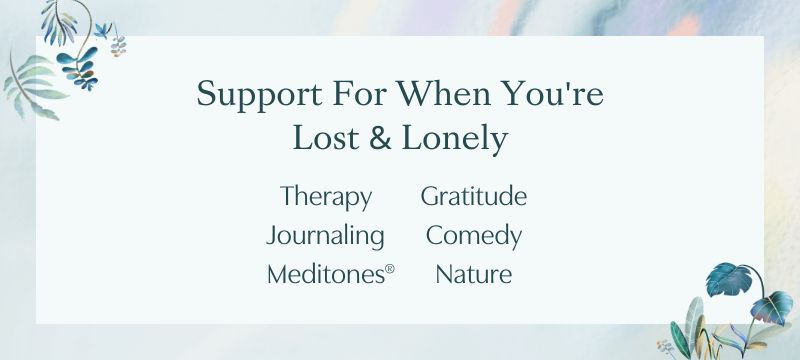
Stage 2: Healing and Hopeful
Now that you’ve started exploring therapy and soothing tools, you’re ready for more.
You’re feeling relief from your anxiety. You’ve got hope for the future.
You know you feel better when you stick to your self care routine. But you get frustrated that you can’t seem to make it stick.
Supportive practices for growth include:
- Keeping small daily promises to yourself
- Tracking your self-care habits and celebrating your wins
- Journaling your progress (you’re further along than you think)
- Surrounding yourself with nourishing relationships
- Reading books or listening to podcasts for self-development
- Practising compassion for yourself when you slip or make a mistake
These practices will help you tune into your own wisdom. And let go of what other people think.
A deep self-love will sustain you.
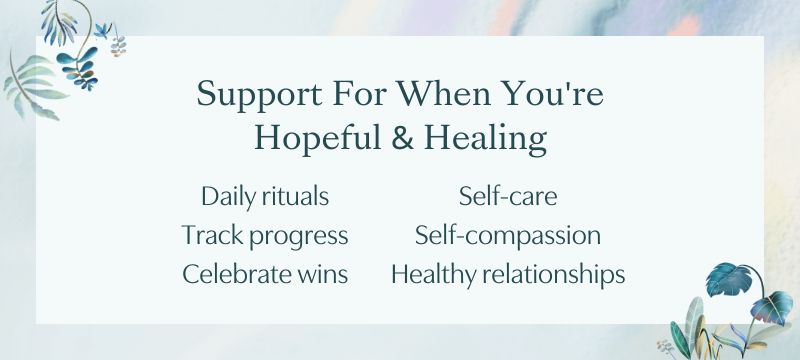
Stage 3: Calm and Confident
You’ve ritualised your self-care. You know who you are and what lights you up. You’re feeling more present, more authentic and whole.
All the healing work you’ve done has truly paid off. And now you’re tuning into a deeper calling.
Perhaps you have leadership aspirations within your community. Or you’d like to help others on their healing journey.
Mabye you’d like to help people grow their own food. Or teach kids how to feel calmer.
Either way, you’re feeling ready to be of service and to start playing big.
Supportive practices for growth include:
- Learning about the impacts of colonialism and systemic discrimination
- Recognising that all systems of oppression are interconnected and upheld via the status quo (eg kyriarchy, intersectionality)
- Appreciating the different privileges you may hold
- Understanding what it means to be a good ally for marginalised communities
- Investigating new ways of living outside of capitalism such as zero waste, intentional communities, and worker owned co-operatives
- Seeking out and listening to diverse voices
- Becoming trauma-informed
All this will help you better understand the world and your place in it.
Plus, it will increase your empathy & improve any collaborative efforts. Such as community building, or running a business.
Whatever your life goals may be? Understanding social justice issues will grow you as a person.
You’ll be more empathic, compassionate, and aware.
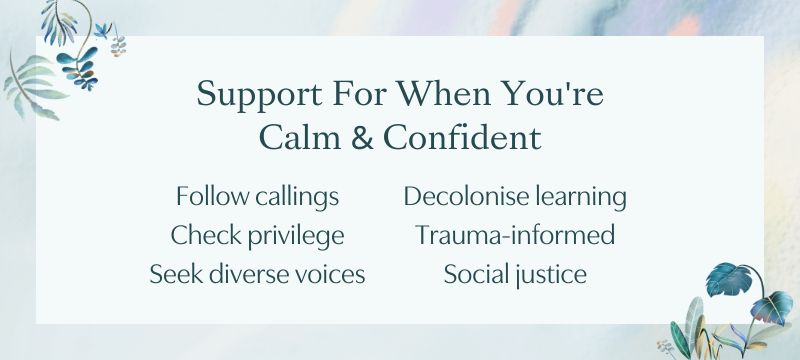
Stage 4: Authentic Altruist
Even though life gets difficult at times? You’ve nailed all the tools and strategies that help you get unstuck. You feel liberated, worthy and resilient.
You are a home to yourself. And now? You’re all in on the deep life.
You’ve quit social media. You’re researching urban gardening and how to do a “no-buy-month”. You’re nourished by creativity.
You regularly connect deeply with your loved ones. You’re actively involved in the social justice movements that matter to you.
The status quo holds no sway. You have the courage to live your values, even when they don’t fit in.
You know it’s okay to be different, and you’re proud of who you are.
Whilst it would seem like this is the final destination for Deep Living? It’s important to remember that growth is not linear.
Maintaining awareness is a vital antidote to the shallow distractions of the world.
Supportive practices that help to support Deep Living include:
- Breathwork
- Somatic practices like Feldenkrais, yoga or Pilates
- Deeper meditation or using longer meditones® tracks
- Finding magic in the mundane
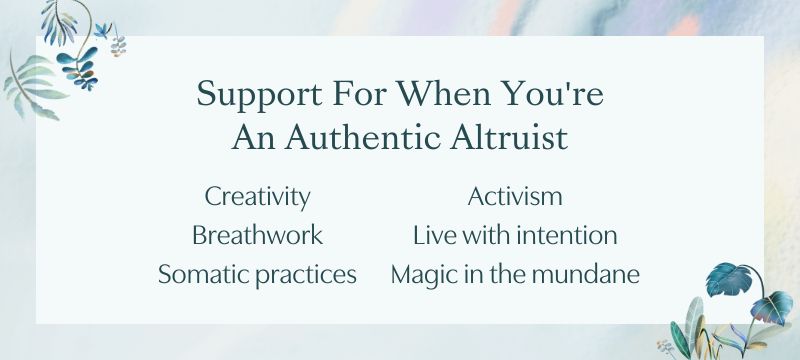
Takeaway
If you’re yearning to discover your life’s purpose. Or live with intention. Or live a more authentic life that is meaningful to you?
Moving through each stage of Deep Living may help you do just that.
Go deeper into calm with the Restful app. Download for free on Google Play or the App Store today!